The wheel has turned full circle; the pendulum has swung back. Once again ‘overseas’ doctors are back in demand. After dismal responses to its recruitment drives, NHS England now intends to attract thousands of GPs from outside the EU.
As the evidence shows that very few from Australia and New Zealand want to come to the UK, the planned influx will likely be from countries that have previously come to the rescue of the NHS – for example, those on the Indian subcontinent.
Overseas doctors constitute nearly one third of the NHS workforce and have undoubtedly made a massive contribution to the health service. Overseas GPs in particular have often worked in areas of high deprivation and demand, usually not preferred by local doctors. They have tended to be a more stable and less mobile workforce. They have become a vital part of local medical services as well as local communities.
Working in such areas can be highly challenging. These GPs have faced higher risks of complaints and investigations by regulatory bodies, received harsher outcomes of these punitive processes and seen fewer opportunities for professional development. There are massive variations in their career progression, for example in pass rates of membership examinations of various royal colleges especially the MRCGP, which persist even for second generation immigrants who have graduated in the UK.
On top of this they have faced a hostile immigration system that continually changes goalposts, even in retrospect, leading to inhumane consequences including the separation of families. The current immigration rules make it near impossible for anyone outside EU to come and train in the UK. Shockingly, general practice does not even figure on the Home Office shortage occupation list, symbolic of the chaos that is exacerbating the current GP recruitment crisis.
Our credibility has not been helped by the anti-immigrant populist narrative of Brexit. Reported hate crimes have seen peak numbers since June last year. Comments right from the top of the government have been damaging.
In a nutshell, the UK has done almost everything possible to make itself one of the least attractive places for the international medical workforce.
Despite all this, the NHS is still the envy of the world, especially the developing countries, and has again been given an overall top ranking by the Commonwealth fund. Despite all its funding constraints, its universal affordability and access is a big attraction for many, especially those who are fed up of private or patient funded health systems and their associated doubtful ethical practices.
But if we expect overseas GPs to come to our rescue, we must not repeat historical mistakes. The relationship between the NHS and overseas doctors must be symbiotic and based on mutual respect and fairness.
Though there has been some progress on opportunities for overseas doctors and around the issue of differential performance, the pace of progress is too slow. It is our moral obligation to be clear and upfront about these issues to potential recruits. They must be allowed to make informed decisions. Failing to do so is immoral and unethical. The expectations of training and need for additional support to adapt to the local systems must be made clear at the outset. Induction, mentorship and ongoing support – both professional and personal – must be thought-through and resourced.
Recruitment must be done in collaboration with the various organisations that represent overseas doctors and have a wealth of experience in issues facing them.
From a practical perspective, a single point of contact for those intending to come to the UK would be a good start. The immigration system must also change to reflect the contribution as well as the needs of a group whose net benefit to the system and society is immense and immeasurable.
The narrative from politicians must change, to reflect reality instead of populist statements that only disrupt harmony.
We have always needed and will continue to need GPs from overseas and we must treat them fairly.
Dr Kamal Sidhu is a GP partner and trainer in Blackhall, East Durham and an overseas graduate who moved from India to the UK in 2005. The views expressed are his personal views only.

















